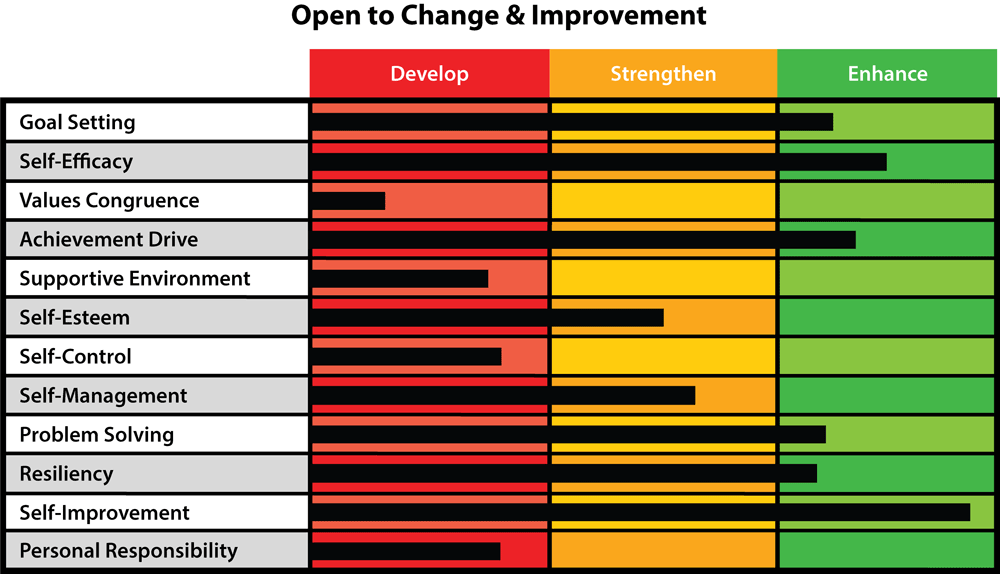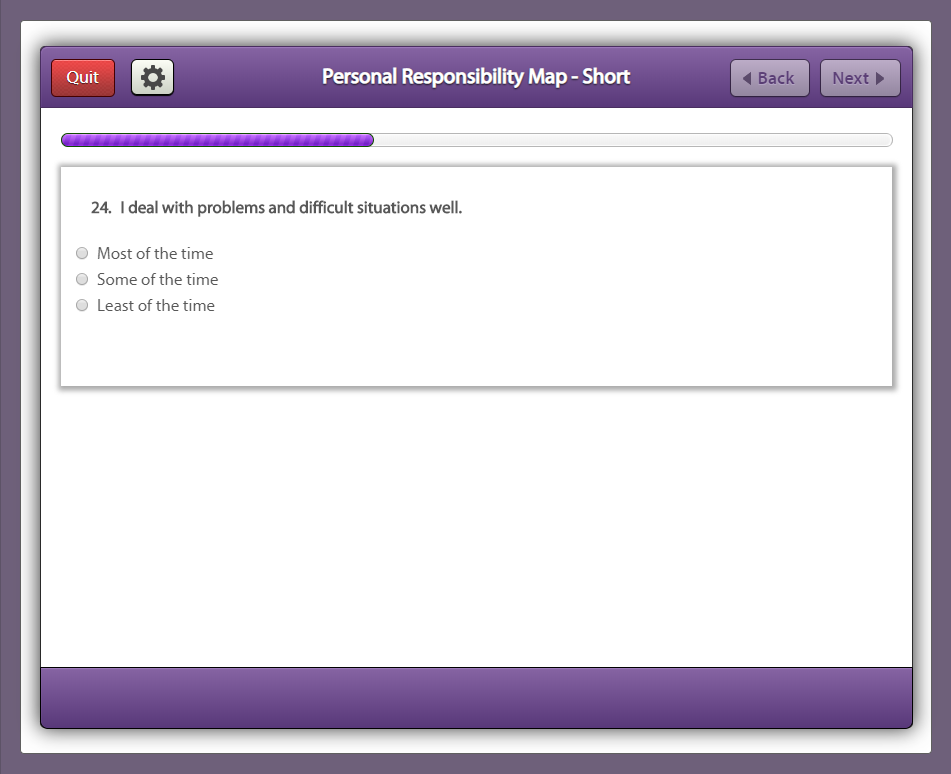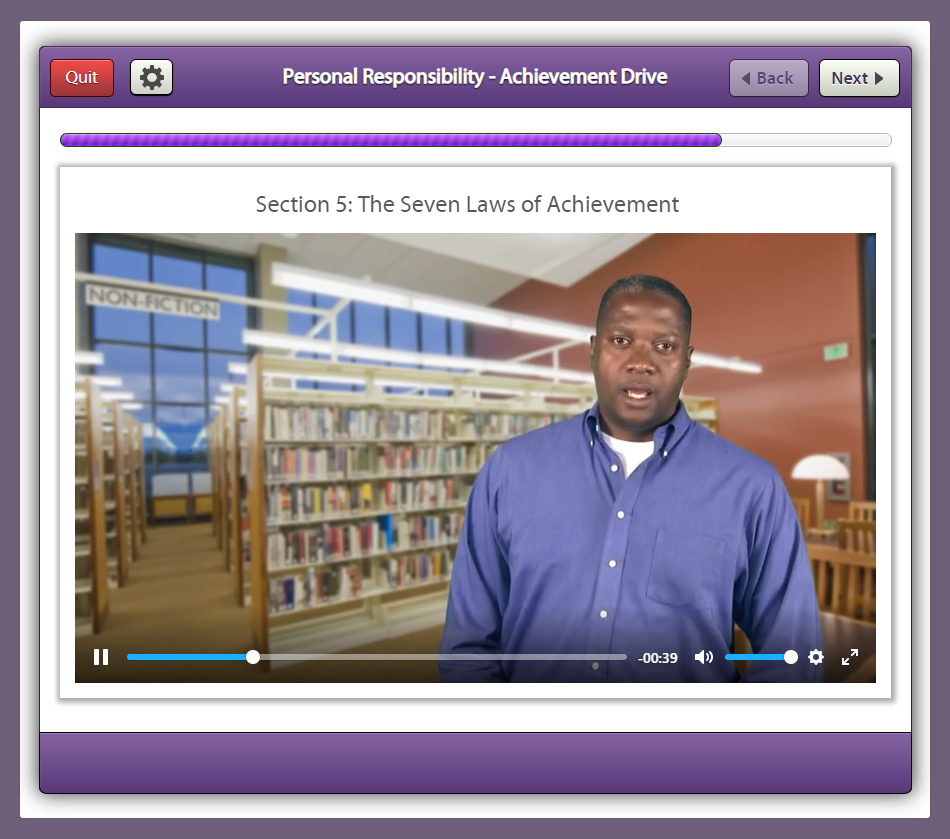Personal Responsibility – Managing Goal Achievement™
Research-based, assessment and skill-building system designed for goal setting and goal achievement.
Personal Responsibility – Managing Goal Achievement™
Research-based, assessment and skill-building system designed for goal setting and goal achievement.
Personal Responsibility – Managing Goal Achievement™ helps users develop the ability to set clear, attainable personal and career goals and, most importantly, develop the necessary skills to help them successfully achieve those goals.
Goal Setting
Nothing is more important to success than the ability to set, manage, and achieve personal goals. This assessment and skill enhancement system focuses on core skills related to personal responsibility and managing goal achievement. Personal Responsibility puts the emphasis where it belongs, on the individual. It puts the focus on the ability to set clear, attainable goals and then to manage oneself to the successful completion of these goals.
Personal Responsibility helps users sort through how well they accept responsibility for their own actions–whether they are successful or not. When failure occurs, do people in your organization procrastinate, blame others, and then engage in victim thinking? If they do, then our Personal Responsibility program will help them overcome these self-defeating behaviors and teach them the skills of personal responsibility.
The low Values Congruence score suggests persons whose values are not consistent with their goals. The high Goal Setting scale indicates an ability to set goals. However, since values are indicative of what really matters, goals will most likely be abandoned for they are not perceived as important (Values Congruence). Another area of concern is the low Self-Control and Personal Responsibility scales. This suggests persons who could let a lack of control over their emotions interfere with their ability to follow through with commitments to their goals. They have a high Self-Improvement score which shows a strong desire to improve performance in these areas. This type of chart is indicative of individuals who are good candidates for specific skill training.
The Personal Responsibility Map
The core assessment is the Personal Responsibility Map™, which focuses on twelve core skills related to personal responsibility in setting and achieving goals. The system also contains the Personal Responsibility Survey™ which is a 360-degree assessment (an assessment done by others who know the individual).
The Personal Responsibility Map and Personal Responsibility Survey provide scale-specific measures of behaviors related to high achievement and personal well-being. Results of the two assessments can be printed and compared. Assessments are electronically scored and all results are presented and explained to the user. Users gain an understanding of where they are and where they need to go.
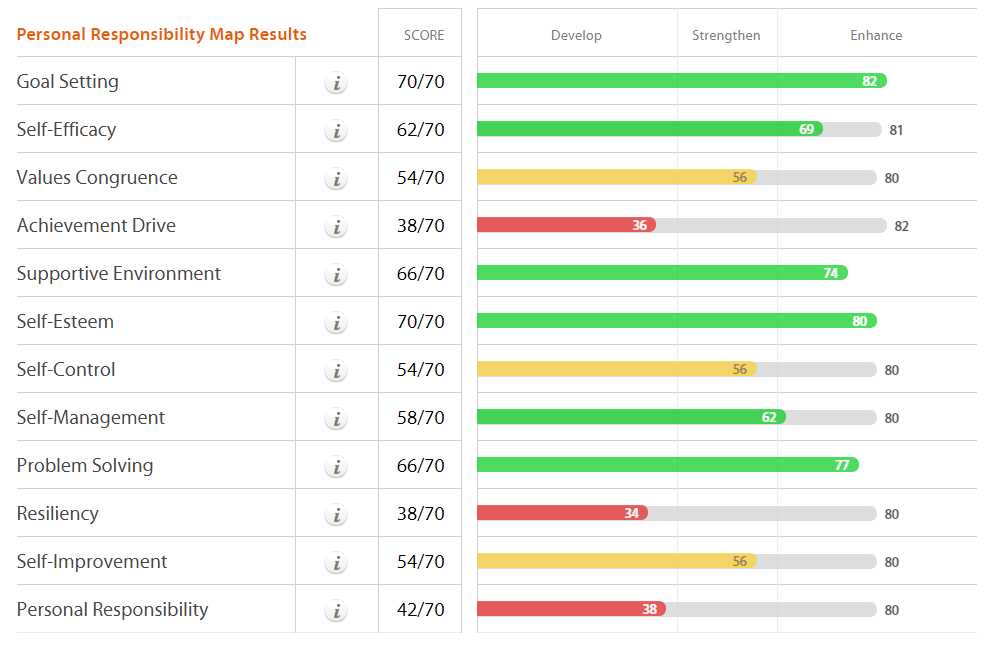
Skill Enhancement Components
The entire Skill Intervention system consists of over 60 hours of self-directed, interactive, on-line, learning activities and post assessments. There are also several off-line individual and group activities. Each skill intervention contains approximately twenty-five short videos introducing key concepts with five hours of online instruction, and individual and group activities. Our instructor-led version can be used for more intense intervention. The skill interventions include:
Goal Achievement Potential
Goal Setting – teaches how to create clear, specific, written goals or objectives with plans and target dates for reaching them.
Self-Efficacy – covers how to improve view of possibilities or extent to which people’s goals are internally viewed as within their possibilities, given their individual knowledge, skills and environments.
Values Congruence – teaches how to develop a healthy balance between personal values, beliefs and desired goals.
Achievement Drive – covers how to increase the level of desire, effort and commitment exerted toward individual goals.
Supportive Environment – explains how the extent to which friends, family or peers have impact on an individual’s achievement and how they can positively encourage people in their goals.
Self-Esteem – teaches how to increase the degree to which people have confidence in and value themselves and feel worthy to enjoy goal achievement.
Self-Management Related to Goal Achievement
Self-Control – teaches the ability and self-discipline to handle personal feelings and emotions in difficult life circumstances.
Self-Management – teaches how people learn to manage their own individual time, talents and abilities and focus these on clear objectives.
Problem Solving – covers how to improve the ability and willingness to objectively work through roadblocks and use creative thinking skills to arrive at desirable goal solutions.
Resiliency – teaches the steps to proactively work through processes and activities and cause bottomline results to happen.
Self-Improvement – helps people learn to be open to change and to learning and to constantly look for ways to improve themselves.
Personal Responsibility – improves the level of individual commitment people are willing to make in setting clear goals and then assuming full responsibility for their achievement.
The Management System
All assessments and instruction are electronically integrated into our management system, eliminating the expensive and time-consuming activities of assigning, scoring and reporting results, and freeing up the program administrator to help where needed. Program accountability is electronically built into the system.
While doing all this, the management system is tracking , scoring, benchmarking, storing and printing information on each user in the system.
We have helped over 13,000 organizations to help millions of people maximize their personal and professional success with our easy-to-use online assessment and skill building tools in Conover Online.
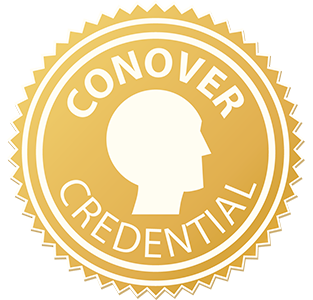
Utilize our unique credentialing system to recognize your participants success in our programs.
